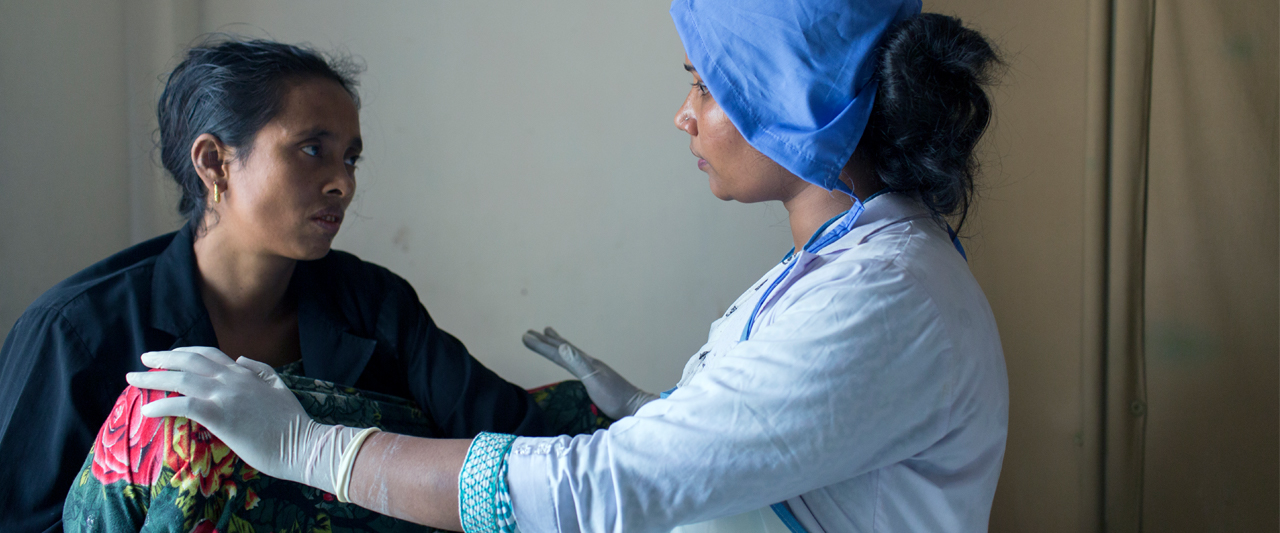Case study of Rohingya refugee camps documents first time safe, legal abortion services were introduced during an acute emergency
Humanitarian health workers see with their own eyes every day that people living in crisis settings have acute needs for sexual and reproductive health care—including safe abortion.
Ipas and partners saw this need clearly in 2017 as more than 700,000 Rohingya refugees fled persecution in Myanmar and arrived in refugee camps across the border in Bangladesh. Many women and girls had experienced terrible violence and arrived in the camps with urgent reproductive health needs, including unwanted pregnancies. In coordination with Bangladesh’s health system and international aid agencies, Ipas Bangladesh trained health workers to provide contraception and safe abortion care (called “menstrual regulation” in Bangladesh) in the refugee camps.
In a case study published last month in Conflict and Health, Ipas authors detail the procedures and policies used to quickly and effectively establish and scale-up safe, legal abortion services for the first time during an acute emergency. The study—Navigating the Crisis Landscape: Engaging the ministry of health and United Nations agencies to make abortion care available to Rohingya refugees—provides evidence that abortion care can be successfully provided during the acute emergency phase of a humanitarian crisis.
Some assert that it’s not practical to introduce safe abortion care during an acute emergency,” says Ipas Senior Researcher and study lead author Tamara Fetters. “To the contrary, this case study illustrates that it is indeed pragmatic to provide abortion care early in an emergency—and that there is definitely demand for the service.”
Sexual and reproductive health services are often not prioritized as essential life-saving health interventions in humanitarian settings, and this is especially true for abortion. Myths persist that there is no need, that abortion is illegal in these settings, that donors will not fund this work and that abortion care is too complicated to provide during a crisis.
“The experience in Bangladesh’s Rohingya refugee camps proves these beliefs held by some to be false and reinforces the fact that politics, more often than any other cause, is the reason that some in the humanitarian community consider abortion as anything other than an essential maternal health service,” Fetters says.
Keys to successfully scaling up services
As most Rohingya refugees approach three years of living in Bangladesh’s refugee camps, Ipas now supports menstrual regulation services in 37 health facilities in the district where the camps are located. The case study details how services began in just eight strategically located health facilities in 2017—out of more than 180 facilities serving over one million people—and how the first training of health workers was organized within weeks of the initial influx of refugees.
By mid-2019 more than 300 health-care workers from 37 facilities had attended clinical trainings in menstrual regulation, care for complications of unsafe abortion and contraception provision. More than 8,000 refugees have now received abortion care, and 26,000 women and girls have received contraception at these facilities.
The case study outlines several keys to success, including:
- a strong existing partnership between Ipas Bangladesh and the country’s ministry of health,
- quick and decisive action by both parties as well as by UNFPA, and
- adapted training approaches that allowed health workers to receive training quickly and be able to continue providing care at the same time to meet the high demand for health services during the crisis.
A growing need worldwide
The number of crisis- and conflict-affected areas in the world continues to grow, with the COVID-19 pandemic and climate change creating additional instabilities. With that in mind, the study points out “it is certain that gains in contributing to the Sustainable Development Goals will need to come from fragile areas, emergencies and protracted crises where 60% of preventable maternal mortality occurs.” Unsafe abortion is one of five leading causes of maternal death and is entirely preventable when safe abortion care is accessible.
“Humanitarian professionals can use this case study to bolster their advocacy for increased and earlier attention to abortion services in humanitarian settings,” says Fetters. “Plus, the details from this study can help ministries of health to build strategies with their humanitarian partners that improve abortion access.”
Learn more
Some of the midwives and paramedics Ipas trained to provide abortion care shared their motivations for doing this crucial work in this video:
Learn more about Ipas’s work to ensure safe abortion access in humanitarian settings.


